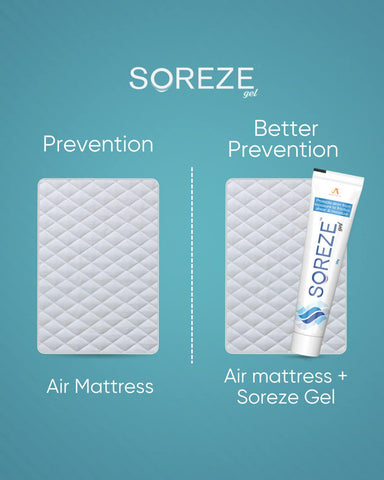
To prevent bed sores, a variety of barrier creams and gels are available to cater to different skin types and conditions. The selection of an appropriate product becomes pivotal in ensuring the best possible care for individuals at risk of developing bed sores. These creams and gels span a spectrum, from those designed for sensitive skin to those tailored for more severe cases of bed sores. Regardless of the choice, adhering to the manufacturer's usage instructions is imperative, and if any queries or apprehensions arise, consulting a healthcare professional is always a prudent step.
One remarkable product that pairs seamlessly with an air mattress to prevent bed sores is Soreze Gel. This powerful combination ensures not only enhanced protection but also heightened comfort for your loved ones.
The world of healthcare presents various challenges, and among them, preventing bed sores in individuals who are bedridden or immobilized remains a significant concern. These sores, also known as pressure ulcers or decubitus ulcers, can lead to severe complications and discomfort if not managed effectively. This is where air mattresses, often referred to as alternating pressure mattresses, come into play.
Air mattresses are ingeniously designed to reduce the risk of bed sores. They operate by continuously alternating the inflation and deflation of air cells, thus creating shifting pressure points beneath the patient's body. This mechanism helps alleviate the constant pressure exerted on specific areas, thereby reducing the likelihood of bed sores. It's a technology that has proven effective in providing comfort and safeguarding the skin's health.
However, it's essential to recognize that even with the benefits of air mattresses, they are not infallible. The risk of bed sores still exists, particularly if certain precautions are not diligently taken. One critical aspect is the regular repositioning of the individual. If they are not shifted or adjusted frequently, pressure points can persist, increasing the chances of bed sores. Additionally, the proper adjustment of the mattress is crucial for its effectiveness. Without the correct calibration, it may not provide the intended relief from pressure.
In light of these considerations, healthcare providers often recommend a complementary approach to enhance bed sore prevention – the use of barrier creams or gels. These specialized skincare products are formulated with the primary purpose of protecting the skin and creating a barrier that guards against moisture, friction, and pressure. By forming a protective layer on the skin's surface, these creams and gels serve as an additional defense against the development of bed sores.
The role of barrier creams and gels is significant in the prevention of bed sores. They not only help reduce the risk of skin irritation and breakdown but can also play a pivotal role in mitigating the severity of bed sores should they occur. Their application is especially crucial in cases where individuals may have sensitive skin or are at greater risk due to underlying health conditions.

The availability of these products in the market offers various options to cater to different needs. Some are specially formulated for individuals with sensitive skin, ensuring that they receive the care and protection required. Others are designed to address more severe cases of bed sores, providing a robust defence against potential complications.
However, when selecting a barrier cream or gel, it's paramount to consider the individual's specific skin type and condition. What works well for one person may not be suitable for another. Therefore, consultation with a healthcare professional is highly recommended to ensure the most appropriate product is chosen.
Conclusion
While air mattresses are undoubtedly effective tools in preventing bed sores, the use of barrier creams or gels alongside them can provide an extra layer of protection for the skin. This comprehensive approach reduces the risk of bed sores and promotes overall skin health. It's a holistic strategy that can significantly enhance the comfort and well-being of individuals who rely on extended bed rest, further emphasizing the importance of skincare in healthcare.
To buy SOREZE GEL visit our Shop Page or click on the BUY NOW button below to order directly:





